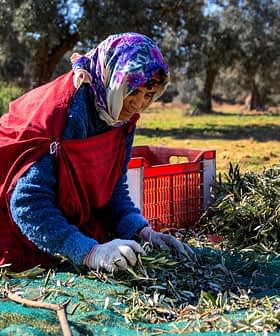Floods are not a new occurrence in Pakistan. However, the relentless rains that fell during the 2022 monsoon season proved disastrous.
The record rainfall caused extensive damage to vital infrastructure, resulting in immense loss of life and property. From June to August, the peak of the monsoon season, more than 1,160 people died, and 3,500 were injured.
The olive oil harvest was also damaged last year because of the massive rainfall. There was a horrendous loss of 17.504 million Pakistani Rupees (€55,000) in total.
The Pakistani government estimated that 33 million people, 13 percent of the population, were affected by the floods, with at least 1 million homes and 5,500 roads, bridges and shops sustaining damage. The World Bank estimated that the flooding caused $30 billion (€27 billion) in damage.
According to Anja Katzenberger at the Potsdam Institute for Climate Impact Research, the impacts of climate change have made Pakistan’s climate even more extreme, with drought and searing heat waves now followed by torrential rain.
See Also:Extreme Weather Events Are Getting Worse, Affecting Food AvailabilityDue to its location between the Indian Ocean and the Karakoram range, home to five of the world’s 14 tallest mountains, Pakistan has always been vulnerable to natural disasters such as floods and tsunamis.
Global warming linked to climate change has increased average air and sea temperatures, which creates more evaporation. Additionally, warmer air temperatures allow the atmosphere to hold more water, significantly increasing precipitation volumes.
According to the Global Climate Risk Index, Pakistan is the eighth most vulnerable nation to climate change. However, European Union data shows that Pakistan is responsible for less than 1 percent of greenhouse gas emissions.
With the 2023 monsoon season already underway, Pakistanis are worried that more torrential rain and flooding are coming. According to a national disaster management official, already, 50 people have died, and 87 have been injured in various rain-related incidents across the country since the monsoon season began on June 25.
While the monsoon season has traditionally provided a lifeline to the country’s massive agricultural sector, it has done more harm than good in recent years.
Pakistan is an agricultural economy, with the sector accounting for about 19 percent of its gross domestic product (GDP) and employing 42 percent of the labor force, according to the country’s finance ministry.
The South Asian country has always relied on the monsoon rains to fill water reservoirs, irrigate farmlands and support crop growth by replenishing groundwater reserves.
However, the intensity of the most recent monsoon seasons has swelled the banks of the Indus River and others, resulting in devastating floods that have washed away the crops and infrastructure.
While cotton, sugarcane, rice, maize and wheat are Pakistan’s most important crops, the country has planted olive trees to produce olive oil in the past decade.
The government has sponsored massive olive tree-growing programs to help farmers diversify their agricultural holdings and prevent desertification. The sector has gained momentum recently and attracted local and international investment.
However, the torrential rains caused significant damage to last year’s harvest, according to Muhammad Tariq, the national project director PakOlive. In the 2022/23 crop year, Pakistan produced 86 tons of extra virgin olive oil.
“It was estimated that 31,580 olive trees were damaged in Balochistan, 1,377 trees in Sindh, 2,500 trees in Khyber Pakhtunkhwa and 5,730 trees in southern Punjab,” he told Olive Oil Times. “The olive oil harvest was also damaged last year because of the massive rainfall. There was a horrendous loss of 17.504 million Pakistani Rupees (€55,000) in total.”
Again, the monsoon poses a significant threat to Pakistan’s future of olive oil farming. Tariq said flooding is likely to cause more olive tree diseases, especially anthracnose, which deteriorates the fruit quality.
The challenges do not stop there. “The replacement to olive cultivation will cause high economic losses to the farmers and national exchequer [treasury],” he added.
This raises concerns as Pakistan is again on the verge of being harshly affected by the monsoon.
For farmers and olive sector officials, the question is whether the authorities have taken the necessary steps to mitigate the impact of torrential rains or whether Pakistan will experience more losses again this year.









